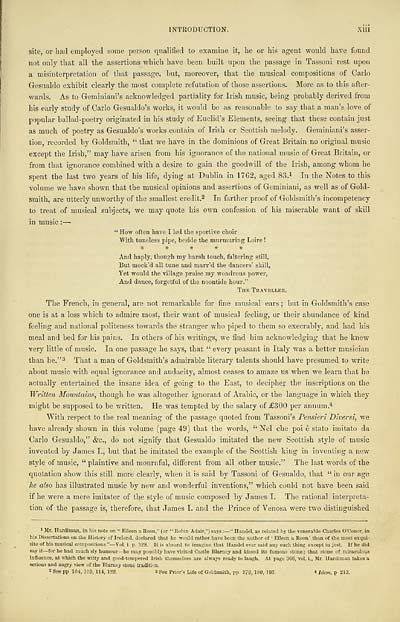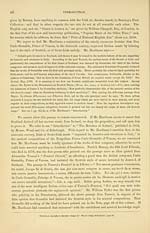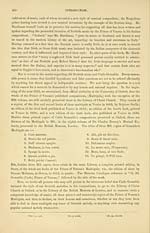Glen Collection of printed music > Printed music > Wood's edition of the songs of Scotland
(21) Page xiii
Download files
Complete book:
Individual page:
Thumbnail gallery: Grid view | List view

INTRODUCTION. XU1
site, or had employed some person qualified to examine it, he or his agent would have found
not only that all the assertions which have been built upon the passage in Tassoni rest upon
a misinterpretation of that passage, but, moreover, that the musical compositions of Carlo
Gesualdo exhibit clearly the most complete refutation of those assertions. More as to this after-
wards. As to Geminiani's acknowledged partiality for Irish music, being probably derived from
his early study of Carlo Gesualdo's works, it would be as reasonable to say that a man's love of
popular ballad-poetry originated in his study of Euclid's Elements, seeing that these contain just
as much of poetry as Gesualdo's works contain of Irish or Scottish melody. Geminiani's asser-
tion, recorded by Goldsmith, " that we have in the dominions of Great Britain no original music
except the Irish," may have arisen from his ignorance of the national music of Great Britain, or
from that ignorance combined with a desire to gain the goodwill of the Irish, among whom he
spent the last two years of his life, dying at Dublin in 1762, aged 83. 1 In the Notes to this
volume we have shown that the musical opinions and assertions of Geminiani, as well as of Gold-
smith, are utterly unworthy of the smallest credit. 2 In farther proof of Goldsmith's incompetency
to treat of musical subjects, we may quote his own confession of his miserable want of skill
in music :—
" How often have I led the sportive choir
With tuneless pipe, beside the murmuring Loire !
*****
And haply, though my harsh touch, faltering still,
But mock'd all tune and marr'd the dancers' skill,
Yet would the village praise my wondrous power,
And dance, forgetful of the noontide hour."
The Traveller.
The French, in general, are not remarkable for fine musical ears ; but in Goldsmith's case
one is at a loss which to admire most, their want of musical feeling, or their abundance of kind
feeling and national politeness towards the stranger who piped to them so execrably, and had his
meal and bed for his pains. In others of his writings, we find him acknowledging that he knew
very little of music. In one passage he says, that " every peasant in Italy was a better musician
than he." 3 That a man of Goldsmith's admirable literary talents should have presumed to write
about music with equal ignorance and audacity, almost ceases to amaze us when we learn that he
actually entertained the insane idea of going to the East, to decipher the inscriptions on the
Written Mountains, though he was altogether ignorant of Arabic, or the language in which they
might be supposed to be written. He was tempted by the salary of £300 per annum. 4
With respect to the real meaning of the passage quoted from Tassoni's Pensieri Diversi, we
have already shown in this volume (page 49) that the words, " Nel che poi e stato imitato da
Carlo Gesualdo," &c, do not signify that Gesualdo imitated the new Scottish style of music
invented by James I., but that he imitated the example of the Scottish king in inventing a new
style of music, " plaintive and mournful, different from all other music." The last words of the
quotation show this still more clearly, when it is said by Tassoni of Gesualdo, that " in our age
he also has illustrated music by new and wonderful inventions," which could not have been said
if he were a mere imitator of the style of music composed by James I. The rational interpreta-
tion of the passage is, therefore, that James I. and the Prince of Venosa were two distinguished
1 Mr. Hardiman, in his note on " Eileen a Roon," (or " Robin Adair,") says : — " Handel, as related by the venerable Charles O'Conor, in
his Dissertations on the History of Ireland, declared that he would rather have been the author of ' Eileen a Roon ' than of the most exqui-
site of his musical compositions." — Vol. i p. 328. It is absurd to imagine that Handel ever said any such thing except in jest. If he did
say it — for be had much sly humour— he may possibly have visited Castle Blarney and kissed its famous stone ; that stone of miraculous
influence, at which the witty and good-tempered Irish themselves are always ready to laugh. At page 366, vol. i., Mr. Hardiman takes a
serious and angry view of the Blarney stone tradition.
2 See pp 104, 109, 114, 122. 3 See Prior's Life of Goldsmith, pp. 179, 180, 195. * Idem, p 213.
site, or had employed some person qualified to examine it, he or his agent would have found
not only that all the assertions which have been built upon the passage in Tassoni rest upon
a misinterpretation of that passage, but, moreover, that the musical compositions of Carlo
Gesualdo exhibit clearly the most complete refutation of those assertions. More as to this after-
wards. As to Geminiani's acknowledged partiality for Irish music, being probably derived from
his early study of Carlo Gesualdo's works, it would be as reasonable to say that a man's love of
popular ballad-poetry originated in his study of Euclid's Elements, seeing that these contain just
as much of poetry as Gesualdo's works contain of Irish or Scottish melody. Geminiani's asser-
tion, recorded by Goldsmith, " that we have in the dominions of Great Britain no original music
except the Irish," may have arisen from his ignorance of the national music of Great Britain, or
from that ignorance combined with a desire to gain the goodwill of the Irish, among whom he
spent the last two years of his life, dying at Dublin in 1762, aged 83. 1 In the Notes to this
volume we have shown that the musical opinions and assertions of Geminiani, as well as of Gold-
smith, are utterly unworthy of the smallest credit. 2 In farther proof of Goldsmith's incompetency
to treat of musical subjects, we may quote his own confession of his miserable want of skill
in music :—
" How often have I led the sportive choir
With tuneless pipe, beside the murmuring Loire !
*****
And haply, though my harsh touch, faltering still,
But mock'd all tune and marr'd the dancers' skill,
Yet would the village praise my wondrous power,
And dance, forgetful of the noontide hour."
The Traveller.
The French, in general, are not remarkable for fine musical ears ; but in Goldsmith's case
one is at a loss which to admire most, their want of musical feeling, or their abundance of kind
feeling and national politeness towards the stranger who piped to them so execrably, and had his
meal and bed for his pains. In others of his writings, we find him acknowledging that he knew
very little of music. In one passage he says, that " every peasant in Italy was a better musician
than he." 3 That a man of Goldsmith's admirable literary talents should have presumed to write
about music with equal ignorance and audacity, almost ceases to amaze us when we learn that he
actually entertained the insane idea of going to the East, to decipher the inscriptions on the
Written Mountains, though he was altogether ignorant of Arabic, or the language in which they
might be supposed to be written. He was tempted by the salary of £300 per annum. 4
With respect to the real meaning of the passage quoted from Tassoni's Pensieri Diversi, we
have already shown in this volume (page 49) that the words, " Nel che poi e stato imitato da
Carlo Gesualdo," &c, do not signify that Gesualdo imitated the new Scottish style of music
invented by James I., but that he imitated the example of the Scottish king in inventing a new
style of music, " plaintive and mournful, different from all other music." The last words of the
quotation show this still more clearly, when it is said by Tassoni of Gesualdo, that " in our age
he also has illustrated music by new and wonderful inventions," which could not have been said
if he were a mere imitator of the style of music composed by James I. The rational interpreta-
tion of the passage is, therefore, that James I. and the Prince of Venosa were two distinguished
1 Mr. Hardiman, in his note on " Eileen a Roon," (or " Robin Adair,") says : — " Handel, as related by the venerable Charles O'Conor, in
his Dissertations on the History of Ireland, declared that he would rather have been the author of ' Eileen a Roon ' than of the most exqui-
site of his musical compositions." — Vol. i p. 328. It is absurd to imagine that Handel ever said any such thing except in jest. If he did
say it — for be had much sly humour— he may possibly have visited Castle Blarney and kissed its famous stone ; that stone of miraculous
influence, at which the witty and good-tempered Irish themselves are always ready to laugh. At page 366, vol. i., Mr. Hardiman takes a
serious and angry view of the Blarney stone tradition.
2 See pp 104, 109, 114, 122. 3 See Prior's Life of Goldsmith, pp. 179, 180, 195. * Idem, p 213.
Set display mode to: Large image | Transcription
Images and transcriptions on this page, including medium image downloads, may be used under the Creative Commons Attribution 4.0 International Licence unless otherwise stated. ![]()
| Special collections of printed music > Glen Collection of printed music > Printed music > Wood's edition of the songs of Scotland > (21) Page xiii |
|---|
| Permanent URL | https://digital.nls.uk/91337995 |
|---|
| Description | Scottish songs and music of the 18th and early 19th centuries, including music for the Highland bagpipe. These are selected items from the collection of John Glen (1833 to 1904). Also includes a few manuscripts, some treatises, and other books on the subject. |
|---|
| Description | The Glen Collection and the Inglis Collection represent mainly 18th and 19th century Scottish music, including Scottish songs. The collections of Berlioz and Verdi collected by bibliographer Cecil Hopkinson contain contemporary and later editions of the works of the two composers Berlioz and Verdi. |
|---|

